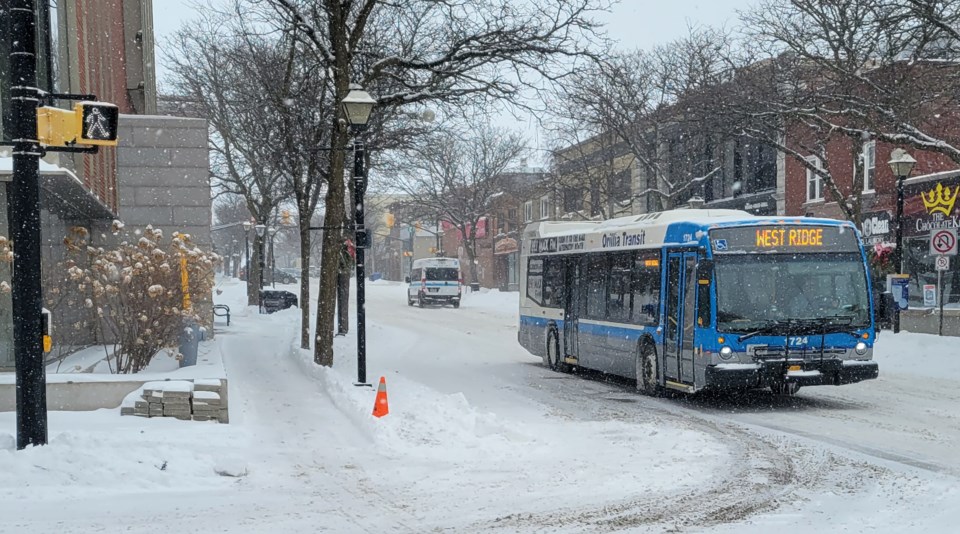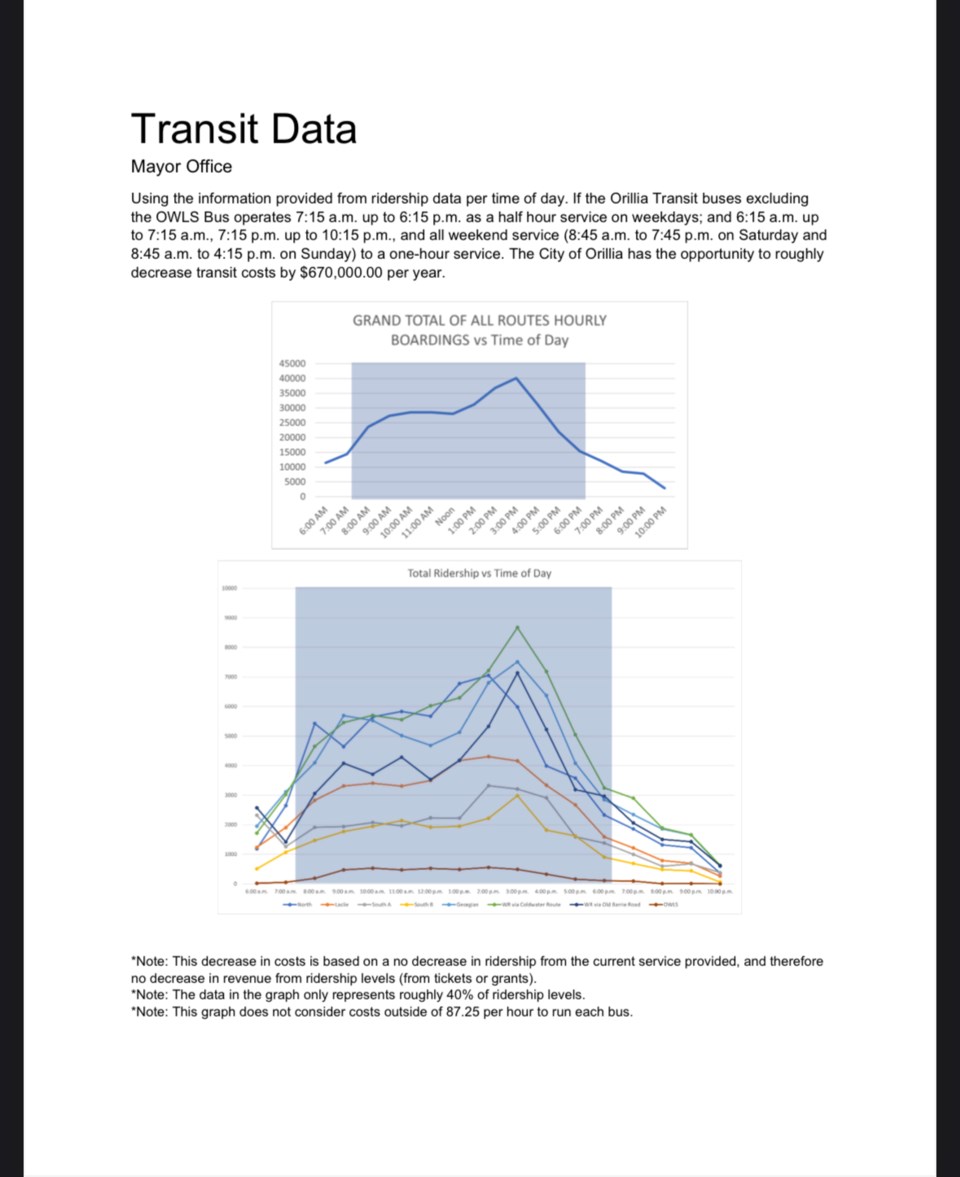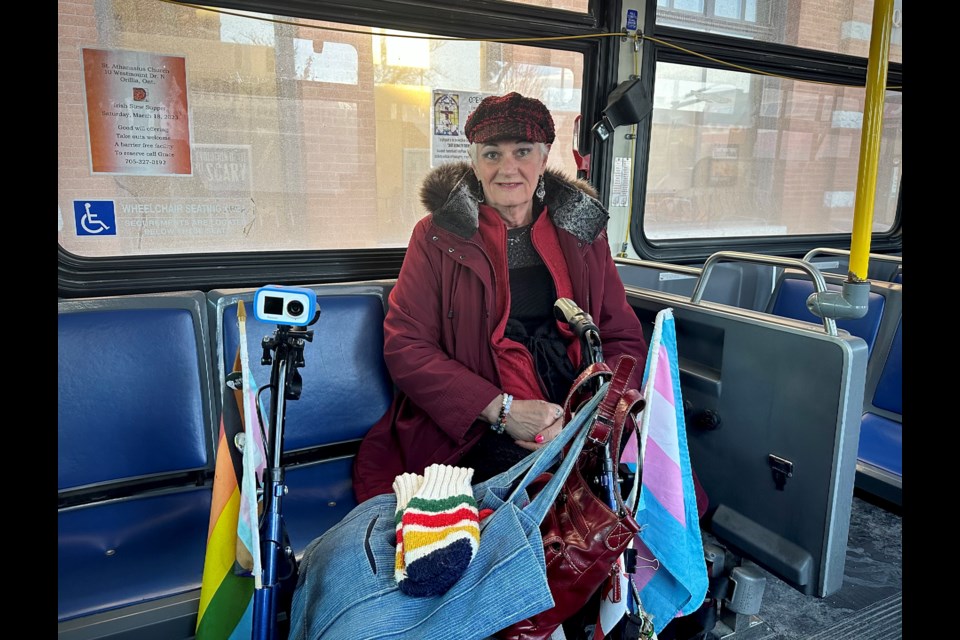Following heated debates about the future of Orillia Transit during 2023 budget talks, city council has tasked the transit advisory committee with considering ways to increase the system’s productivity, efficiency, scheduling and costs.
Local transit became a lightning rod for discussion through budget deliberations after Mayor Don McIsaac proposed service cuts during off-peak hours to bring savings to the city.
The system comes with a $3.77-million price tag this year while generating roughly $1.71 million in revenue, and McIsaac’s plan would have realized $300,000 in savings for 2023 and $670,000 in annual savings moving forward.
The proposed changes would have seen transit reduced to hourly service all day on weekends, and on weekdays from 6:15 to 7:15 a.m., as well as 7:15 to 10:15 p.m., as opposed to the current half-hourly service during all days and hours.
McIsaac proposed the cuts due to a significant drop in ridership during the proposed hours.
The move was ultimately voted down by council after McIsaac brought it to both the Feb. 9 and 27 budget discussions, but not before a handful of residents passionately opposed the mayor’s idea at council’s Feb. 27 meeting, or without inspiring numerous residents to submit letters to the editor on the topic to OrilliaMatters.
The committee’s report will return to council for consideration May 1, and the public can send feedback until March 23 through the city website.
In the meantime, reporter Greg McGrath-Goudie has spent hours riding the city's buses and various routes and talking to regular transit users.
Rider thoughts
In the wake of the discussion, OrilliaMatters reporter Greg McGrath-Goudie has spent hours riding the city’s buses and various routes, talking to regular transit users. They were asked to weigh in on the proposed changes, provide ideas for improving the system, and what they think of the situation as it currently stands.
A majority of riders spoke against cutting service.
Joe Cornelisse said he notices ridership drop off in the evenings, but he does not view cutting service as the appropriate path forward — particularly in the morning, when his son relies on the city’s half-hourly service to get to high school.
“I have seen the buses go by at night with the lights on and there (is) nobody using them, but, in saying that, you've got to keep the transit rolling,” said Cornelisse.
 “If they cut … service down or it stops, people are going to stop using it, and then it’s just going to go backwards. They can’t take money and do improvements at the same time. That’s just not going to happen.”
“If they cut … service down or it stops, people are going to stop using it, and then it’s just going to go backwards. They can’t take money and do improvements at the same time. That’s just not going to happen.”
Miranda Smillie and her young child use the bus as their main means of transportation, and she agrees with council’s decision against cutting service.
“Honestly, I’d probably vote it down, too, just because the bus is my main source of transportation right now and it’s hard to get around with a little one,” she said.
Margot King, similarly, uses the bus to go downtown with her granddaughter. She said regular service is important for many Orillians.
“People rely on it, and everybody has different shifts. Especially for the younger people who don’t have vehicles, there’s no other way to get around,” she said. “Ask (McIsaac) if he had to rely on it, and see what he thinks.”
A couple of riders, however, said they were not opposed to the cuts.
“It sounds pretty feasible,” said a woman who wished to remain anonymous.
Room for improvement
Most riders said they were happy with the current system, citing fairly timely service and good hours, but one Lakehead University student said he would like to see service extended.
“After 10 p.m., I don’t get any bus, so I have to walk. I live in the West Ridge area, so I have to walk down,” said Ayush Nath, who regularly has lectures until 10 p.m. “Bus hours should be increased.”
Resident Ivy Beaton had numerous suggestions for improving transit, and said she is not opposed to making the system more cost effective.
“I’m going to sit on the fence because some of these cuts are necessary, and it depends on how they mandate them,” she said. “If they look at the money that they want to cut, find out where are we doubling and where two buses are going up and down the same road 5,000 times a day.”
However, she is reluctant to see cuts ahead of evaluating the current system’s efficiency.
“Why is that necessary? That’s fuel, that’s time, that’s wages, so our bus routes just need to be really looked at,” she said. “How about we restructure things instead of cutting?”
Beaton noted routes where buses need to make left turns on busy roads, suggesting a few routes in the city are “backwards” and need to be looked at, and she said the bus accessibility ramps are often not functioning properly.
As a trans woman, Beaton also said she has experienced transphobia on city transit at the hands of a driver, but she noted most transit employees are respectful.
After getting a hip replacement, she had to use a wheelchair temporarily.
“They were playing games with lowering the buses, the ramps not working,” she said. “Sometimes it wasn’t legitimate. Sometimes it was made up, playing with a wrong toggle switch.”
After she switched to a walker, Beaton said one bus driver took off from a stop well before she could find a seat.
“He fired the bus up in gear and sent me sailing, and I had 32 staples from a total hip-replacement surgery … so, yeah, that wasn’t a fun experience,” she said. “The other person behind me is yelling at the bus driver, like, ‘What’s the matter with you? Like, you treat all the people with canes and stuff like that.’”
Following that experience, Beaton met with OPP and spoke with a city councillor, and she began riding the bus with a camera attached to her walker, recording each trip, and she takes detailed notes every time she uses transit.
“I did go meet with the OPP, and they were wonderful,” she said. “The OPP (said) this is horrible; I shouldn’t have to experience this.”
Beaton said she does not like the idea of her recordings invading the privacy of others, but she believes it’s her only option to feel safe on city transit.
“I feel kind of (bad) running around with that thing sometimes, but it’s in defence. If I didn’t have that (and) I had to get on the bus with this guy, who knows what would happen?” she said.
“If this is my only avenue of defence, that’s horrible.”
Beaton suggested transit drivers should be required to take “self-awareness” courses to ensure all riders feel safe.
Cornelisse, as well, suggested the city keep “a closer eye” on how the transit system is running.
“I think it takes a certain person to drive a bus like that … just being able to deal with the people that are coming on and off the bus,” he said. “I’ve noticed some of the drivers are kind of just on the rude side of things … with other riders. I just think the city should be keeping an eye on the company that they’ve hired to run it.”
He also suggested the city implement a discount students could access with their student ID cards.
“Back when I was in high school, they had a student fare, but they don’t (now),” he said. “(My son) goes to high school, (and) he pays the same amount as any adult on the bus.”
The transit report
After city council voted down McIsaac’s first attempt to reduce service in off-peak hours, he brought an inquiry motion to the Feb. 13 meeting of council, asking the transit advisory committee to look into ways of improving the system.
“I think, for me, (it will provide) a thorough review of the options, and looking at … should we provide discounts for seniors? Should we provide students a discount? Should we look at the routes?” McIsaac told OrilliaMatters. “One of the things that was important for me, personally … we have a lot of students here, and we want them to stay and have a positive experience.”
 McIsaac said he views transit as an essential service, but he argued cutting service during hours with substantially lower ridership does not affect anyone.
McIsaac said he views transit as an essential service, but he argued cutting service during hours with substantially lower ridership does not affect anyone.
“Transit is an essential need, and I think we all acknowledge that. I think that my question was, why do we have empty buses? Can we do better? Those were the initial impetus,” he said.
“If you cut a service that people aren’t using, if there’s nobody on the bus, there’s no one affected.”
Coun. Janet-Lynne Durnford, who sits on the transit advisory committee, hopes the report coming to council in May can suggest ways to enhance the system and increase ridership without spending additional money.
“How can we enhance services without investing more than we’re investing now?” she asked. “I think we’re putting an appropriate amount of money into the transit system — that’s my personal opinion — (but) how can we enhance services to better meet the needs of ridership?”
Durnford noted the city received more than $600,000 for this year’s provincial gas tax rebate, which is used specifically for improving municipal transit systems, and said the amount of funding Orillia received is indicative of a well-functioning system.
“Our transit system is actually incredibly well used by all measures. It’s a very effective and efficient system,” she said. “Compared to comparable Ontario cities, we have six to eight times the ridership of cities that have transit systems that are about the same size as Orillia, so we get a much larger gas tax credit, which is how the transit system (and) the infrastructure for the transit system is mostly funded.”
Durnford, who spoke strongly against McIsaac’s proposed cuts at the Feb. 27 council meeting, said she views transit as a “very necessary expense.”
“I think (of) transit as an investment into the people of the city, into the infrastructure of the city, into the economic health of the city, because people rely on transit to get to work,” she said. “It’s a public good, and I see it as a very necessary expense.”
Brandon Rhéal Amyot, who also sits on the transit advisory committee, disagreed with the cuts McIsaac proposed.
“I think that they need to look at other ways to make this a financially sustainable system and, at the end of the day, cuts are just not the way to do that,” said Amyot, who is vice-president of the Lakehead University Student Union (LUSU). “I appreciate what was trying to be done, but I just think that there’s better ways of going about it.”
Amyot hopes to see a variety of improvements made to the system, such as extended hours on weekends for students and residents who work service jobs, or any resident who would like to go out on weekends.
They questioned why the advisory committee was not consulted prior to the attempted cuts.
“I think we can all appreciate what (McIsaac) was trying to do. I just question, why wasn’t there a process followed?” they said. “Why didn’t we come to the transit advisory committee first to request information, and then see what the transit advisory committee advises? That’s the whole point of these advisory bodies.”
However, they are happy to see the committee given a chance to carry out its work now.
“I am very glad that the committee will now have a chance to actually do the work that it’s supposed to, and hopefully we’ll be able to work with council and present them with some recommendations … that will hopefully result in some changes.”
Since 2010, LUSU has had an agreement with the city to provide transit service for students in exchange for funding. So far, for the 2022-23 school year, the student union has paid more than $184,000 into the transit system.
Durnford said she is reluctant to make cuts to the system, especially with consideration to the city’s provincial gas tax funding and its agreement with LUSU, which might cut into the savings McIsaac wanted to realize.
“We don’t want to make cuts that are going to mean LUSU walks away from their agreement with the city, because that’s going to have a huge economic impact as well,” she said. “Ridership (numbers are) also calculated in those … figures that are used to get that gas tax grant, so if we lose Lakehead riders, it’s also going to have an impact in terms of that gas tax.”
McIsaac, however, noted the cuts, had they been approved, would not have taken effect until later this year, which would have given council ample time to consider any needed changes before the city’s relationship with LUSU was affected.
The transit advisory committee’s report will be brought to council May 1.
